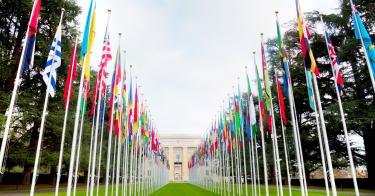In my last column, I looked at some of the dysfunctions of the U.N.’s Programme of Action (PoA) on the illicit trade in small arms and light weapons. In this column, I’ll focus on how the U.S. tries and sometimes fails to come to grips with dysfunctional institutions like the PoA.
The most fundamental U.S. difficulty is that, in most U.N. venues, the U.S. is permanently on the defensive: the best we can do is to limit our losses. I would love to take the offensive, to come up with proposals that we can back and to force others to react to them, instead of us being forced to always react to the idiotic proposals of others.
But the very complexity of our policy process makes this close to impossible. We are like a muscle-bound giant, rendered nearly immobile by the need to run everything through the inter-agency process. This no doubt has advantages: our process cuts down on mistakes.
Unfortunately, our process also cuts down on our initiative. It puts us in a defensive crouch, from which we sally forth in the hope that our preparation will allow us to cut others down to size. Sometimes, this works. But sometimes, it doesn’t — and it ensures that we can never do better than play for a draw.
That’s particularly true because, though lots of nations are willing to say they object to proposals, they almost all fold like a deck chair when the going gets tough. In the last days of the PoA, for example, Switzerland gave the impression that it would die in a ditch to prevent any mention of “illegal armed groups” in the PoA. But in the end, it rolled over.
Similarly, Syria objected vehemently to the way the PoA was drawing in all the U.N.’s development goals. But then it quit. The U.S. is one of the very few nations that is willing to take a stand and stick to it — but since no one else is willing to stand up to the progressive assumptions of the U.N.’s majority, that means we are almost on our own in protesting seriously against idiocies.
And as one member of the U.S. delegation put it to me, whenever the U.S. lets its guard down and allows an idiocy to survive, it spreads like a virus through the entire system. The NGO delegations sitting behind me certainly didn’t see it that way: they were busy fantasizing about shooting the U.S. delegation so that the Americans would understand how vital it was to include ammunition in an agreement that is already more honored in the breach than the observance.
Yet the fact remains that the U.S. delegation was right on the merits and the NGOs are wrong. And that stands for something important. The PoA is an international organization, of a sort. It’s far from the most important one, but it has its place — or at least it could, if it stuck to its knitting.
Supposedly in this era of populism, the world’s international organizations are under threat as never before. Yet the PoA’s defenders are completely unwilling to buckle down and focus on curbing the actual illicit trade in small arms. Instead, the PoA is a venue for gender politics, development ideology — and gun control. Instead of serving as the organization’s antibodies, its nominal defenders undermine it at every turn by using it as a forum for their ideological hobby-horses.
The end result is that another international organization is biting the dust: the PoA is a talking shop, and very little more. Given what the PoA has come to stand for, that’s not a bad thing.
But it didn’t have to be that way. The PoA could have done its bit to clamp down on gun-running, to encourage marking of firearms, and to promote tracing of crime guns. It could, in a word, have been serious. But it isn’t serious, and it doesn’t want to be serious. That’s too bad.
Unfortunately, no subject is so serious that it can’t be rendered silly if it’s controlled by unserious people.
This piece originally appeared in Forbes https://www.forbes.com/sites/tedbromund/2018/07/12/why-the-u-s-struggles-to-come-to-grips-with-the-u-n-s-gun-control-program/



